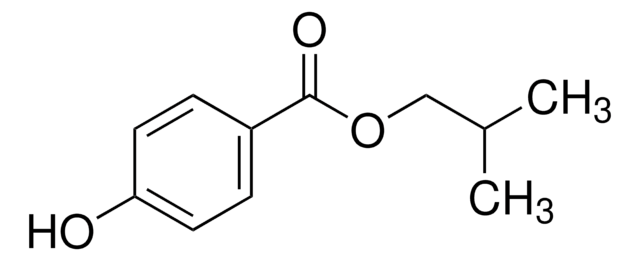H5501
Méthyl 4-hydroxybenzoate, 4-hydroxybenzoate de méthyle
ReagentPlus®, ≥99.0%, crystalline
Synonyme(s) :
Ester méthylique d’acide p-hydroxybenzoïque, NIPAGIN, Parahydroxybenzoate de méthyle
About This Item
Produits recommandés
Niveau de qualité
Gamme de produits
ReagentPlus®
Pureté
≥99.0%
Forme
crystalline
Pf
125-128 °C (lit.)
Chaîne SMILES
COC(=O)c1ccc(O)cc1
InChI
1S/C8H8O3/c1-11-8(10)6-2-4-7(9)5-3-6/h2-5,9H,1H3
Clé InChI
LXCFILQKKLGQFO-UHFFFAOYSA-N
Vous recherchez des produits similaires ? Visite Guide de comparaison des produits
Application
- in sex-linked recessive lethal (SLRL) test in Drosophila melanogaster
- as a constituent in cream formulation
- as an antifungal agent in Drosophila melanogaster culture
Actions biochimiques/physiologiques
Informations légales
Clause de non-responsabilité
Mentions de danger
Conseils de prudence
Classification des risques
Aquatic Chronic 2
Code de la classe de stockage
11 - Combustible Solids
Classe de danger pour l'eau (WGK)
WGK 1
Point d'éclair (°F)
334.4 °F
Point d'éclair (°C)
168 °C
Équipement de protection individuelle
dust mask type N95 (US), Eyeshields, Gloves
Faites votre choix parmi les versions les plus récentes :
Certificats d'analyse (COA)
Vous ne trouvez pas la bonne version ?
Si vous avez besoin d'une version particulière, vous pouvez rechercher un certificat spécifique par le numéro de lot.
Déjà en possession de ce produit ?
Retrouvez la documentation relative aux produits que vous avez récemment achetés dans la Bibliothèque de documents.
Les clients ont également consulté
Notre équipe de scientifiques dispose d'une expérience dans tous les secteurs de la recherche, notamment en sciences de la vie, science des matériaux, synthèse chimique, chromatographie, analyse et dans de nombreux autres domaines..
Contacter notre Service technique




